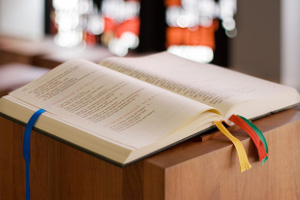 Read in combination with Matthew 4 and Romans 5 and a long Christian tradition it is rather easy to read Genesis 2 and 3 as a story of ‘sin’ and ‘punishment’; a story of ‘temptation’, ‘disobedience’ and ‘the fall’.
Read in combination with Matthew 4 and Romans 5 and a long Christian tradition it is rather easy to read Genesis 2 and 3 as a story of ‘sin’ and ‘punishment’; a story of ‘temptation’, ‘disobedience’ and ‘the fall’.
But this reading does not really fit t:he text of Genesis 2 and 3 (maybe that is why the lectionary only chooses part of the story). None of these words: ‘sin’, ‘disobedience’, ‘punishment’ actually feature in the story. What does feature are two trees: the tree of life and the tree of knowledge of good and evil, both in the middle of a garden. Adam is to ’till’ (abad is really ‘serve’) and ‘keep’ (shamar is ‘keep’ in the sense of ‘watch’ or ‘guard’ or ‘preserve’) the garden and presumably these two trees. I have always been very surprised that God forbids Adam to eat from the tree of knowledge of good and evil. I thought morality and conscience were good things; I further thought they might be what makes humanity different from other animals; what is more I thought conscience might be what makes us in the image of God. But then this is the God who makes animals and thinks that they can be a partner for Adam. Now the tree of life I am less sure about. Immortality and the hankering after it do not seem virtues in the same way. The combination of the two trees is indeed divinity.
5 March 2017
Gen.2:15-17; 3:1-7
This weekly blog on one of the lectionary readings is by Anna-Claar Thomasson-Rosingh, Director of Studies for the Centre for Formation in Ministry.

Leave a Reply